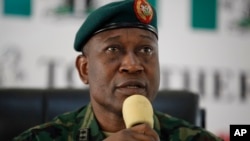The multinational offensive against the Boko Haram Islamist militants will not be deterred by threats from the group’s leader to disrupt Nigeria’s March 28 election, according to military spokesman Major General Chris Olukolade.
“All of those empty threats are very likely reactions to the ongoing offensive and it will continue,” said Olukolade. “The move will continue and the essence is to achieve the objectives of incapacitating the group to the extent that they cannot be the nuisance that they have always been.”
He said the military operation will restore law and order in areas formerly controlled by the militants, and minimize the security threat to residents.
Olukolade’s comments followed the latest Boko Haram threat to scuttle the election.
He said the prospects of success are good for the military operation against the militants.
“Consistently the plan is to ensure that there is heat on them from every part as we try to sweep them from where they are having their activities prevalent. A lot of offensives have started against every location where they are and it’s yielding results, and we are doing this in the spirit of very highly coordinated air and land operation. Each move is backed by appropriate air strikes that have also been yielding results,” said Olukolade.
“We are also enjoying good coordination from the neighboring countries whose business is to ensure that they put pressure on them even when they are under heat here,” said Olukolade.
“Everyone is watching [their] side of the mission, [and] a lot of recoveries are being made. A number of casualties are being suffered on their [Boko Haram] part, and we are having very minimum casualty on our side. So the whole thing is progressing as designed,” he added.
Olukolade said the military operation’s objective is protecting civilians and maintaining the country’s territorial integrity. He said the operation is designed to put pressure on Boko Haram.
He also said the offensive aims to cut off supplies and destroy hideouts from where the militants often launch attacks.
“It’s to ensure that terrorists don’t have a free range to attack innocent civilians who have clearly been their target, and occasionally to engage in daring attack against security agencies,” Olukolade said.
“We believe that by the time this operation is over or concluded to a high degree, this tendency should have reduced very much to enable normal social-economic activities as well as other political activities, political or whatever to take place in every part of our country,” he added.





